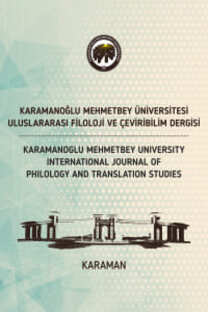THE EVOLUTION OF ESTATE POETRY IN THE SEVENTEENTH CENTURY ENGLISH LITERATURE
On yedinci yüzyıldaki İngiltere’de, malikâne şiirinin - pastoral şiirin alt türü olarak - kullanımının ve popülaritesinin artışı görüldü. Malikâne şiiri jeorjik şiir türünün bazı konularını içerebilmektedir. Bunların arasında kırsal yaşamının övgüsü, kraliyet sarayındaki yolsuzluktan çekilme, yıkıcı İngiliz İç Savaşı (1642-1649) aksine paralel ve ideal dünyaların kuruluşu yer bulmaktadır. Makale, bu temaların jeorjik şiirin ötesinde daha çok pastoral şiirin temaları arasına girdiğini öne sürüyor. Makale, Alastair Fowler'in türsel değişim sistemine göre, Ben Jonson'un “Penshurst’a” (1616) adlı şiirini, malikâne şiirinin birincil aşaması olarak değerlendirmektedir, ve İngiliz İç Savaşından sonra yazılmış olan Andrew Marvell'in “Bahçe” (1653) adlı şiirini, alt türünün üçüncül aşaması olarak sunmaktadır.
Anahtar Kelimeler:
Malikâne şiiri, Pastoral şiiri, Jeorjik Şiiri, Türsel değişim, Ben Jonson, Andrew Marvell
THE EVOLUTION OF ESTATE POETRY IN THE SEVENTEENTH CENTURY ENGLISH LITERATURE
The seventeenth century England saw the increase in the use and popularity of estate poetry as a sub-genre of the pastoral. The paper argues that though estate poetry contains some topics common for the genre of the georgic - the praise of country life, the retreat from the corruption of the court, the assembly of parallel and ideal worlds, as a contrast to the devastating reality of the English Civil War (1642-1649) - these features have more to do with the genre of the pastoral than with literature on the subject of husbandry. The paper presents a contrastive study of “To Penshurst” (1616) by Ben Jonson, which acts as the primary stage of the sub-genre, and its post Civil War successor – Andrew Marvell’s “The Garden” (1653), as an exemplification of the tertiary stage any sub-genre moves onto in the process of its development according to Alastair Fowler’s system of generic transformation.
Keywords:
Estate poetry, Pastoral, Georgic, Generic transformation, Ben Jonson, Andrew Marvell,
___
- Cousins, A.D. and R.J. Webb. (2005). Appropriating and Attributing the Supernatural in the Early Modern Country House Poem. Early Modern Literary Studies, 11.2, 4-26.
- Fishelov, D. (1993). Metaphors of Genre. The Role of Analogies in Genre Theory. Pennsylvania: The Pennsylvania University Press.
- Fowler, A.(1986). Country-House Poems: The Politics of a Genre. The Seventeenth Century, 1, 15 December, 2-6.
- Fowler, A. (1987). Kinds of Literature. An Introduction to the Theory of Genres and Modes. Oxford: Clarendon Press.
- Gifford, T. (1999). Pastoral. London and New York: Routledge.
- Greg, W. W. (1984). Pastoral Poetry and the Pastoral Ideal. The Pastoral Mode: a Casebook. Macmillan Publishers.
- Hobbes, Th. (1971). 'Answer' to Davenant's Preface to Gondibert. Sir William Davenant's 'Gondibert'. Oxford: Clarendon Press.
- Jones, E. (2004). Renaissance ‘Country House’ Poetry as Social Criticism. http://www.english-literature.org/ essays/renaissance-poetry.html. Access date: 14.04.2018
- Johnson, S. (2003). ‘Rambler’ (No. 37, 1750). The True Principles of Pastoral Poetry. Selected Essays. London: Penguin Classics.
- Jonson, B. (2006). To Penshurst. The Norton Anthology of English Literature. 8th ed., Vol. 1, (ed.) Stephen Greenblatt. New York: W.W. Norton & Company, 1434-5.
- Loughrey, B. (1984). The Pastoral Mode. A Casebook. Macmillan Publishers.
- Lynch, J. (1991). Glossary of Literary and Rhetorical Terms. New Brunswick: Rutgers University.
- Marcus, L. (2003). Literature and the Court. The Cambridge History of Early Modern English Literature. (eds.) David Loewenstein and Janel Mueller. Cambridge University Press.
- Marvell, A. (1987). Selected Poetry. (ed.) Robert Wilcher. London: Methuen.
- Oxford University Press. (2010). Pastoral. Oxford English Dictionary. Oxford: Oxford University Press, 1300.
- Yayın Aralığı: Yılda 2 Sayı
- Başlangıç: 2018
- Yayıncı: Karamanoğlu Mehmetbey Üniversitesi
Sayıdaki Diğer Makaleler
VERDE el-YAZICI: HAYATI ve EDEBÎ KİŞİLİĞİ
TURKISH EFL LEARNERS’ PERSPECTIVES ON INTERCHANGE SERIES
التأثير والتأثر بين الشّعر والثورة والمجتمع دراسة في شعر ثورة 1919 المصرية
ÇEVİRİDE EŞDEĞERLİK OLARAK DEVİNGEN EŞDEĞERLİK KOMBİNASYONLARI
ÇİNCEDEN YAPILAN ÇEVİRİ HATALARI
ROMAN REEL HAYATIN BİR KILAVUZU OLABİLİR Mİ? VE AHMED MİDHAT
THE EVOLUTION OF ESTATE POETRY IN THE SEVENTEENTH CENTURY ENGLISH LITERATURE
